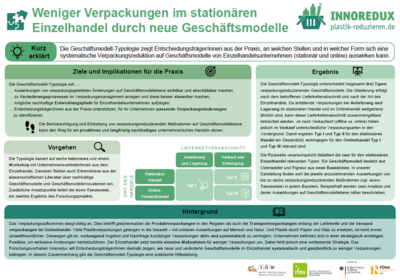Less packaging in bricks and mortar retail through new business models
The volume of packaging is constantly increasing. This applies equally to the product packaging we see on the shelves, transport packaging along the supply chain and shipping packaging for e-commerce. Some of the plastic packaging ends up in the environment, where it becomes microplastic - with uncertain effects on people and nature. And replacing plastic with paper and glass is not always more environmentally friendly. Instead, it is necessary to reduce the supply and demand of short-life packaging actively and systematically as a preventive measure. Companies are in a strategically important position to bring about effective changes. The retail trade is already implementing individual measures to reduce packaging. However, a comprehensive strategy is missing. The research project Innoredux intends to illustrate to decision-makers how new and modified business models in the retail trade systematically and holistically contribute to less packaging.
Using Osterwalder and Pigneur's Business Model Canvas, this factsheet shows how the introduction of more environmentally friendly packaging solutions in stationary retail companies is impacting business models. It is based on the key findings of the research report “Ansätze einer nachhaltigkeitsorientierten Verpackungsoptimierung“ by Schmidt, Bick and Rubik (2020). It is directed at decision-makers in bricks and mortar retail and seeks to support them in selecting the appropriate packaging changes for their company and better assessing the consequences. This ensures less uncertainty and better controlling of the otherwise complex innovation processes. In addition to objectives and implications for companies, two approaches and their effects on business model level are described in more detail.



